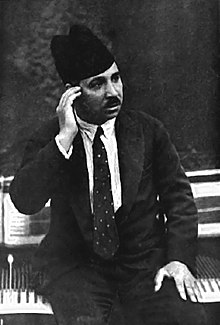Muhammad al-Qubanchi
Muhammad al-Qubanchi محمد القبانچي | |
|---|---|
 | |
| Background information | |
| Born | 1904 Baghdad, Iraq |
| Died | April 2nd, 1989 |
| Labels | Composer, Maqam reciter |
Muhammad al-Qubanchi (Arabic: محمد القبانچي), born Muhammad Abd al-Razzaq al-Ta’i (Arabic: محمد عبد الرزاق الطائي), is an artist and singer from Baghdad, Iraq. He is one of the creative pioneers in the field of Iraqi maqam who also modernized it, and he is considered one of the most famous maqam reciters in Iraq.[1]
Early life[edit]
Muhammad Abd al-Razzaq al-Ta’i was born in Baghdad in 1904, and he worked with his father in the Shorja market as a crafter with his father. He was nicknamed "al-Qubanchi", a title given to someone who is skilled in weighing agricultural crops with a scale which was also his father's profession. At a young age, he was introduced to Iraqi maqam and its origins which is where his love for the genre began. He would also meet with many Maqam lovers at the market and the Kadouri Café. At age 12, he excelled in singing maqam and other genres and also practiced theatrical acting.[1][2]
Career[edit]
Al-Qubanchi first considered becoming a grain merchant but decided to depend on singing for his livelihood, and in order to maintain his social position and financial sufficiency. by his 20s, he mastered the Iraqi Maqam and attended the Cairo Congress of Arab Music in 1932 as the leader of the Iraqi delegation in the presence of King Fuad I of Egypt. He competed with the artist Umm Kulthum and the artist Mohammed Abdel Wahab.[1][2] Reportedly, Ahmed Shawqi met with al-Qubanchi and told him "This is a great heritage, and you are a great Iraqi artist."[3]
Al-Qubanchi's renewal of the performance of the Iraqi Maqam is considered a major shift in the course of Iraqi music, and he was able, despite his opponents from the supporters of the older styles, to create a school of maqam with clear features, and his students were able to preserve it until it became his ideal method for readers. His teachings became dominant in the performance of the maqam and among his students were the artists Yousuf Omar, Nazem al-Ghazali and Abd al-Rahman Khader.[1]
Among his most important achievements is his employment of Arab lyrical colors, such as Muwashahat, Groans, Mawwal, and the Egyptian Dawr, and their combination with the Iraqi Maqam with the aim of making the Maqam familiar in the Arab countries.[4]
Later life[edit]
On May 28, 1969, al-Qubanchi announced his retirement and moved to al-Karkh district where he used his money to build a mosque, he had seen in a dream. He also became its first preacher in 1977. On the evening of April 2, 1989, he passed away in Ibn al-Bitar Hospital and was buried in the mosque he built.[2]
Al-Qubanchi Mosque[edit]
Al-Qubanchi Mosque (Arabic: جامع القبانچي) is a mosque built by Muhammad al-Qubanchi with his own money, located in the Karkh District. Al-Qubanchi had originally commissioned a designer to design him a special house for him after retirement but, reportedly, one night he heard "O' Muhammad, this is a place for prayer, not for sleep" in his sleep. He then woke up and scrapped his ideas for his house and converted them into a mosque. The mosque built at his own expense and opened it in 1977 in the presence of the Minister of Awqaf at the time. He was also its first preacher and muezzin and care of the mosque himself, and he used to pray in it every Friday.[5]
Legacy[edit]
The Hungarian composer and pianist Béla Bartók wrote about al-Qubanchi when he visited the Cairo Congress of Arab Music "No Arab artist, other than the rural colors or the color of the city, presented a great performance filled with all the elements of drama, and I can even say that the Iraqi performer rose to the peak level in musical performance."[3]
See also[edit]
References[edit]
- ^ a b c d "في مثل هذا اليوم: وفاة محمد القبانجي". almadapaper.net. Retrieved 2023-06-11.
- ^ a b c https://www.arabicmagazine.net/Arabic/ArticleDetails.aspx?id=8455
- ^ a b "الگاردينيا - مجلة ثقافية عامة - الاسطورة المقامية محمد القبانجي ومؤتمر القاهره الموسيقي الاول /١٩٣٢". www.algardenia.com. Retrieved 2023-06-11.
- ^ "محمد القبانجي.. شيخ المقام العراقي". alrainewspaper (in Arabic). 2018-04-23. Retrieved 2023-06-11.
- ^ "الگاردينيا - مجلة ثقافية عامة - جامع القبانجي في بغداد". www.algardenia.com. Retrieved 2023-06-11.
